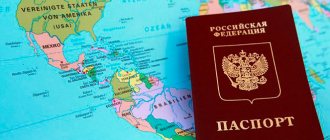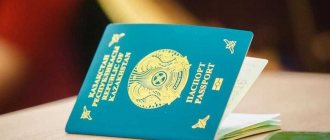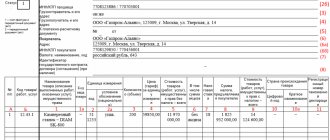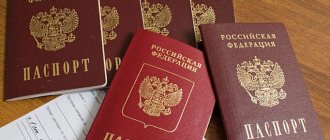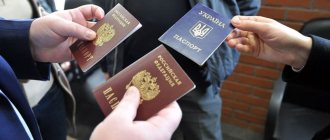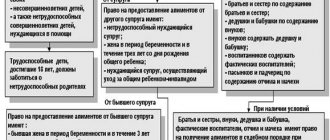To better understand the entire procedure for confirming Russian citizenship for a child, it is worth finding out who has the right to use this.
Upon birth, children acquire Russian citizenship in the following situations:
- The father and mother (or the only parent) at the time of the child’s birth are citizens of Russia (regardless of the place of birth of the child).
- One parent is a citizen of the Russian Federation, and the second is recognized as stateless (stateless person), or his location is unknown (regardless of the place of birth of the child).
- One of his parents has Russian citizenship, and the other parent is a foreign citizen, provided that the child was born on Russian territory (otherwise he will become stateless).
- Both parents are foreign citizens or stateless persons, live in Russia, the child was born on the territory of Russia, and the state of which his parents or only parent are citizens does not grant the child its citizenship.
- A child who is on the territory of Russia and whose parents are unknown becomes a citizen of Russia if the parents do not show up within six months from the date of his discovery.
If a child received Russian citizenship at birth, then the confirmation procedure must be completed before the age of 14, that is, until the child receives a passport as a citizen of the Russian Federation.
Confirmation of Russian citizenship involves submitting documents for a special mark to be placed on the child’s birth certificate. Until 2002, a special insert served as a document certifying Russian citizenship for a child, but then it was replaced with a stamp that is simply placed on the back of the child’s birth certificate (if necessary).
At the moment, birth certificate inserts confirming Russian citizenship are active. They do not need to be replaced with stamps. They have not lost their legal force.
Step-by-step instructions for the procedure for confirming Russian citizenship for a child:
- Initially, when leaving the maternity hospital, you should take a certificate confirming the birth of the baby.
- With this certificate, the parents of the baby contact the registry office and register it in order to obtain a birth certificate.
- A visit to the migration department of the territorial department of the Ministry of Internal Affairs of Russia to affix a mark on citizenship (if necessary).
Documents for Russian citizenship of a child:
- Baby's birth certificate.
- Photocopies of father's and mother's passports.
- Original passports of parents.
- Application in the prescribed form.
There is no state fee charged to parents for confirmation of citizenship.
If the child was born before July 1, 2002, then the main package of documents to confirm the child’s Russian citizenship is supplemented by a document that confirms the registration of the father and mother in the Russian Federation on February 6, 1992.
As a document confirming the residence of one of the parents (or two, if both parents are citizens of the Russian Federation) on February 6, 1992 on the territory of the Russian Federation, there may be an apartment card, a house book or a certificate issued by the village administration about registration for that period of time .
If parents cannot confirm the fact of their residence on the territory of the Russian Federation on February 6, 1992 due to the fact that they themselves were children, then their parents, that is, the child’s grandparents, must provide all data. This is quite legal, since in 1992 the registration of children was carried out jointly with their parents, and many people registered their children only after reaching 14 years of age in order to obtain a passport.
If a baby born on the territory of the Russian Federation, one of the parents has Russian citizenship, and the other is a citizen of another country, then the child is also a citizen of Russia.
Why might a newborn child need citizenship?
Registration of Russian citizenship for a baby is not a mandatory procedure. If there is no need, then the question can be postponed until the age of 14. The law does not provide for any monetary fines or sanctions during this period.
But the issue is usually dealt with much earlier, since status is a condition for receiving certain government services.
Citizenship for a child will be required for the following procedures:
- Traveling abroad – you can go on vacation with a baby only if you have the appropriate documents;
- Maternity capital is a prerequisite for the subsidy;
- To mark in the parent’s passport;
- Enrolling in school/kindergarten is the most important point;
- Make a foreign passport for the child.
At the age of 14, a teenager receives a standard internal passport.
Good reasons to receive
Particularly common is the so-called acquisition of citizenship by birth. A simplified stamping procedure allows you to register the status in the first days of a newborn’s life. But most often the need for this is dictated by life circumstances.
Common reasons:
- planning a trip with a child abroad;
- submitting documents for a foreign passport;
- registration of an internal Russian passport;
- recording information about the newborn in the passport of legal representatives;
- registration at the place of registration;
- enrollment in a preschool or school institution;
- receiving maternity capital.
All this proves that obtaining Russian citizenship for a newborn child is not mandatory, but a necessary procedure. If both parents are Russians, this greatly simplifies the process.
How and where to obtain citizenship for a newborn child
The procedure begins with collecting a package of documents and submitting it to the migration department of the Ministry of Internal Affairs. There is no state duty, the procedure is free.
The list of required papers in the standard version (when both parents are citizens of the Russian Federation) is as follows:
- Birth certificate;
- Birth certificate;
- Parents' ID;
- Marriage certificate.
Let's look at the process of obtaining citizenship step by step.
Certificate and birth certificate
You may also like
1
Filling out the form to participate in the program...
6 851
First of all, they receive the main document of the newborn - a birth certificate. It is prepared by the staff of the medical institution where the birth took place.
The document contains the following data:
- Gender of the baby;
- Name of the medical organization where the birth took place;
- Data from the obstetrician;
- Date and exact time of birth.
A birth certificate will be required for registration at the city registry office, where they receive a birth certificate. In addition to a certificate from the maternity hospital, you must provide your parents' passports and marriage certificate. It is preferable to apply at the place of residence of the parents (or one of the parents). If this is not possible, then registration at the place of birth is provided.
The service can also be obtained using new government services - at the MFC or on the State Services website:
- At the MFC, everything happens in a similar way - a package of documents is submitted, then the parents pick up the certificate;
- With the State Services website the situation is somewhat different. An online application is created on the website. It is sent to the registry office information system and processed. Then you receive a notification that the certificate is ready and can be picked up.
Citizenship
The procedure is within the competence of the Main Directorate for Migration Affairs of the Ministry of Internal Affairs. Having collected the documents (this means passports and birth certificates), the father and mother should contact the FMS department and write an application. The procedure takes an hour at most; FMS employees stamp the certificate and enter information into the parents’ passports - the child’s citizenship is formalized.
Attention! There are minor documented differences depending on year of birth.
Documents for Russian citizenship for a child, if he is included in the parent’s application
If you are applying for citizenship for yourself and include a minor in the application, then you need to prepare the following set of documents for your son/daughter:
- Child’s passport (if any): original + notarized translation.
- Child's birth certificate : original + musical translation.
- A document that confirms the child’s residence in the Russian Federation (migration registration, TRP/residence permit of the child, TRP/residence permit of the parent with information about the son or daughter, extract from the house register, copy of the apartment card, copy of the financial personal account).
- The child’s consent to obtain citizenship (not required for children under 14 years of age).
- Consent of the second parent for the child to become a Russian citizen (needed if the child does not live in Russia).
- 3 photos , 3x4 cm, matte. Only needed for children over 6 years old.
There is no need to pay a separate state fee for a minor when filing jointly.
How to obtain citizenship for a newborn child in special situations
The legislation provides for several cases of registration of citizenship:
- Both are citizens of Russia. Regardless of the place (including country) of birth, the baby receives Russian citizenship;
- Father or mother is an immigrant. If a newborn was born in the Russian Federation, then he is guaranteed Russian citizenship. But a child born abroad will be considered a stateless person for the Russian authorities;
- The first parent is a Russian citizen. The second is in one of the statuses - evading recognition (this also includes divorce), listed as missing, or the identity of the parent has not been established;
- Both are foreign nationals. If immigrants live on the territory of Russia and the child was born here, then registration of citizenship is allowed under one condition - the native state of the father/mother refuses to grant citizenship;
- The child was left an orphan - after six months, the newborn is assigned citizenship of the Russian Federation.
In general, the grounds can be formulated by the expression - there is the right of blood and the right of soil. This means family ties and place of birth. Let's look at each option in more detail.
You may also like
1
Finding suitable work with temporary residence permits in the Russian Federation
3 136
Both citizens of the Russian Federation
Was discussed above. The procedure takes a minimum amount of time. But there is an important addition. If the birth took place abroad, then you should contact the Russian consulate/diplomatic mission, and not the FMS department. Everything happens in the same way.
The most important document will be your local birth certificate. It must be translated into Russian, notarized and presented at the consulate. To legitimize the status, the data is entered into the foreign passport.
Father or mother is a foreigner
When one of the parents is a migrant and the other is a Russian, the deciding factor becomes the place of birth, and the so-called right of soil comes into force:
- If the child was born in the Russian Federation, then additional paperwork (different from the standard case) will require the written consent of the foreign parent;
- The second option is that the birth took place on the territory of the foreign parent’s home state. Then the newborn is granted citizenship of that country.
There is another possibility – the child was born neither in the Russian Federation nor on the territory of the migrant’s home state. This is perhaps the most complex case, since jus soli is interpreted differently in each country. For example, in the United States, an infant will be eligible to become a United States citizen.
Location unknown/divorce/evading confession
In case of divorce and evasion of recognition, all parental rights pass to one of the parents.
The receipt procedure is exactly the same, but one of the following documents is additionally required:
- Certificate of deprivation of parental rights;
- Certificate stating that the father/mother is listed as missing.
Both are foreign nationals
A child of migrants cannot obtain Russian citizenship solely by right of soil. There is an important condition - the native state must refuse to obtain its citizenship. As a rule, this happens very rarely. Those who wish to do so have only a long way to go through migration services, temporary residence permits, permanent residence (for a newborn), and so on.
Orphan
Since Russia takes part in an international agreement aimed at reducing the number of stateless people in the world, all orphans are entitled to Russian citizenship. If the baby’s parents do not make themselves known within six months, the child is recognized as an orphan, and responsibility for upbringing and maintenance passes to the Russian authorities.
Therefore, all paperwork and procedures are handled by employees of the Federal Migration Service, orphanages and relevant departments.
The right of soil and the right of blood are not always clearly understood by the authorities. For example, for orphans, the place of birth is a determining factor. But for children of migrants with the same place of birth, the law of soil will not apply. It should be noted that the above examples cover most cases, but there are still nuances that can play a decisive role.
Statement
To confirm and accept citizenship, different types of applications are written. They are slightly different from each other.
In both cases, the form is filled out by one of the parents, preferably in block letters or legible handwriting. Correcting or crossing out entries in the application is strictly prohibited. Only reliable information must be provided on the form. Providing false information will result in denial of citizenship.
You can also fill out the application on your computer. The form must be filled out exclusively in Russian. Spelling and punctuation errors are not allowed in the text.
There are several types of applications for Russian citizenship. A specialist from the migration department will advise you on the application form you need to fill out during your consultation.
In both types, information such as:
- Information about the child who will be granted Russian citizenship.
- Information about parents: initials, dates of birth, place of birth, citizenship, as well as passport details.
Important points
The actions of parents when obtaining Russian citizenship for a newborn deserve special attention. For example, some people prefer to laminate a birth certificate to better preserve the document. The civil registry office warns that this should only be done as a last resort, because... The matte surface creates obstacles for stamping.
Important points may be related to refugee newborns. Left homeless, stateless persons have the right to grant Russian citizenship to their child. Our legislation provides for a simplified procedure - the parents of the child receive a residence permit, and the child becomes a citizen of the Russian Federation. Of course, the procedure is coordinated with the mother or father who fled from the military conflict zone.
Russian citizenship is issued to children left without the care of parents, adoptive parents, guardians and other representatives. The issues of registering the status of newborns are usually dealt with by the guardianship and trusteeship authorities.
Design features for foreigners
Please note that the entire procedure described above is of a general nature and is fully applicable only in cases where the parents are Russians who gave birth to a child on the territory of the Russian Federation. If they are foreigners, there may be some peculiarities in the procedure for acquiring citizenship for their child.
Children of foreign citizens born in Russia become Russians only on the condition that the state of citizenship of the parents, by virtue of domestic legislation, does not grant citizenship to their children. To affix a stamp to the birth certificate, such foreigners will have to submit to the Main Directorate for Migration of the Ministry of Internal Affairs a document from the migration authority of their country as confirmation of the absence of grounds for granting the child citizenship other than Russian.
A similar document will also be required if the mother is a Russian citizen and the father is a foreign citizen, despite the fact that citizenship is unconditionally granted to children born in Russian-foreign couples on the territory of the Russian Federation. It is worth noting that in addition to this document, officials may require the foreign parent to present a valid document confirming his right to reside in the Russian Federation, for example, a residence permit.
If a foreign woman gave birth in Russia, what citizenship the child may have depends on what rules are provided by the country of which she is a citizen. If the legislation of the mother’s country of citizenship does not provide for the granting of citizenship to a child born in Russia, he will be a Russian citizen regardless of who the second parent is.
Who is eligible to apply for citizenship?
Please note that registration of citizenship of a newborn, as well as an older child, is carried out in accordance with the Decree of the President of the Russian Federation of November 14, 2002 No. 1325.
The following can contact the relevant authorities to obtain a mark of citizenship for a newborn:
- Parents or one of them.
- Adoptive parents, including foreigners.
- Guardians, including heads of orphan organizations. These persons have the right to request the assignment of Russian citizenship for children placed in these institutions.
To do this, you must provide documentary evidence of parental or guardianship authority. For parents it will be, for adoptive parents - an adoption document, for guardians - an act of the guardianship authority.
Now we will understand how citizenship is assigned to a newborn or a person under 14 years of age, and also pay attention to some features of this procedure.
Possible problems
Difficulties may arise in obtaining Russian citizenship for a newborn child. This applies to cases where the baby's mother and father get divorced. In this case, one of the parents does not appear at the registry office and does not submit documents confirming his identity.
In this case, the mother is recommended to make a petition stating that she does not know where the father of the newborn is. When the application is considered, the registration procedure takes place only in the presence of the mother.
If the child's father is a citizen of another state, the infant's citizenship is determined by a joint written application. This document must contain the notary's seal.
Where to contact
Russians live not only in Russia, but also abroad, which, however, does not prevent their newborn children from becoming citizens of the Russian Federation. Therefore, the answer to the question of where to obtain Russian citizenship for a newborn child will depend on the location of his parents.
According to clause 1 of the Regulations, any appeals related to issues of citizenship are submitted by citizens:
- If they live in Russia - to the territorial department of the Main Directorate for Migration of the Ministry of Internal Affairs of the Russian Federation.
- If they live outside of Russia and do not have a place of residence on its territory, the child’s right to citizenship can only be realized through consulates and diplomatic missions.
Please note that even if you live on the territory of the Russian Federation, you cannot apply for citizenship either through multifunctional centers or through the State Services website remotely - the procedure requires only a personal application.
Check out more detailed information.
Having found out where citizenship by birth is obtained, let’s turn directly to the procedure itself.


